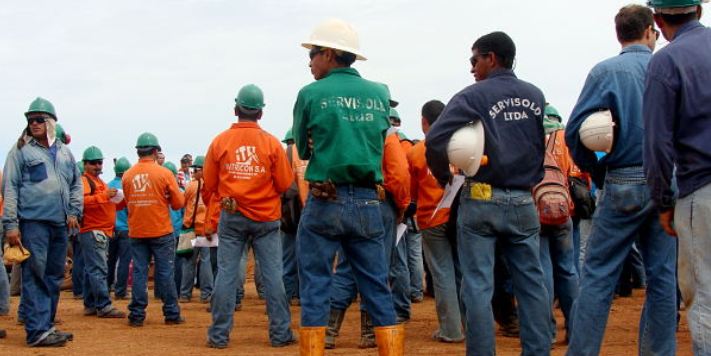
EspañolColombia’s Labor Minister Luis Eduardo Garzón recently announced that three large companies asked him for permission to fire a total of 8,400 of their workers. The companies, however, denied the claim, which they interpreted as an attack against them.
While the debate centers around who is telling the truth, the circumstances themselves call for reflection. This seems to be yet another sign the Colombian economic boom is over. The price of oil and raw materials is falling, and the US Federal Reserve is ending its absurd policy of quantitative easing.
This will continue to devalue the Colombian peso. As a result, inflationary pressure will mount up, forcing the Colombian Central Bank to raise interest rates. Even if we’re not on the eve of a depression or a recession, we can expect lower rates of growth than those we have become used to during recent years.
These growth rates, however, were artificial. Wealth was neither created nor accumulated during the previous upswing. We all fell under the illusion of growth, but the numbers were being distorted by internal and external factors, especially the exchange rate vis-à-vis the dollar and the price of raw materials.
Artificially low interest rates merely reflected this mirage. They were artificial because they never corresponded to free-market interactions. Rather, they resulted from the decisions of “experts” at the Central Bank.
Interest rates were artificially low, because, according to Central Bank figures, banks’ average lending rates fell constantly since 1998. Average rates in June 1998 were an incredible 50.49 percent (no wonder that the next year’s depression lasted until at least 2000). In June 2001, interest rates were fixed at 21.54 percent. In June 2009, they sank to under 12 percent, and in June 2015, they reached 10.98 percent.
When rates become so attractive for creditors, it’s possible that many projects that would have been unfeasible under normal market conditions became attractive for investors. Possibly, this is why companies invested in those projects. But this simply creates an illusion that bursts when the conditions which allow those artificially low interest rates come to an end, forcing companies to cut back on their investments. This is why unemployment rises as a result.
But beyond this straightforward observation, the truly alarming aspect of the layoffs is that companies seemingly have to ask the government for permission to fire their workers. How can we speak of free enterprise in Colombia if businessmen can’t take these types of decisions without government intervention?
Perhaps the worst part of the matter is that the companies involved don’t even question the Labor Ministry’s modus operandi. They merely seek to deny the minister’s claims, instead of demanding to know why they should seek his authorization to fire their own employees in the first place.
No government bureaucrat or minister can possibly be aware of the particular challenges that any private company faces at any given moment. Therefore, they can’t know for certain whether a company’s decision to lay off its workers is justified or not. Not every determination of this type is a response to a crisis, whether current or imminent.
Owners and managers might take into account future plans that might create even more jobs than those temporarily done away with. All of this is beyond any minister’s understanding, especially one who, like Garzón, never created wealth, but rather led labor unions before living comfortably off the state.
[adrotate group=”7″]
In the end, those regulations whereby the government “allows” companies to take certain decisions have never been questioned, although they are based on completely harmful assumptions.
The first is that there is, in Marxist terms, a natural contradiction between entrepreneurs and workers. This is why, supposedly, the government must protect workers from predatory business owners. This would imply that companies fire their workers not for economic reasons, but, according to Marxists, due to a metaphysical determinism.
If this were true, businessmen would lay off employees exclusively to harm them, regardless of the impact on their business. Can anyone believe such tripe?
The fact is, however, that the government’s supposed protection of workers actually creates incentives for entrepreneurs not to create more jobs. If wealth creators know that they can’t fire workers when they deem fit, they won’t hire under normal circumstances since they will be aware that their hands will be tied in a time of crisis.
At the same time, the owner-worker dichotomy rests on the belief that any wealth created belongs to all of us, and hence the companies that create wealth, rather than belonging to the business owner, are a sort of public good. But this is false.
There is no such thing as collective property belonging to all of society. Companies do not belong to Colombians. Rather, they contribute to society by operating, but they belong to their owners.
When we ask ourselves why prosperity is only artificial, we fail to realize that we can’t create wealth when entrepreneurs need the government’s permission to fire their own workers. Illusions don’t create wealth, nor do the type of market distortions we are now used to.
Individuals, and especially entrepreneurs, are the real wealth creators.
 Versión Español
Versión Español












